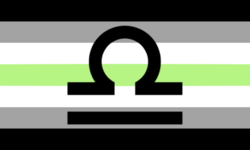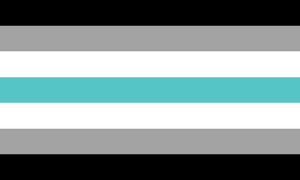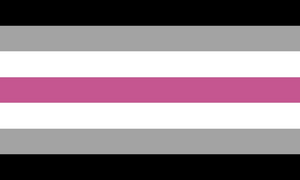Libragender
| File:Text lines white icon.svg | This article has multiple statements without valid sources to support them. You can help the Nonbinary Wiki by adding sources to this article! |
 | |
| Related identities | Agender and Demigender |
|---|---|
| Under the umbrella term | Nonbinary |
| Frequency | 0.3% (aggregating all libra identities) |
Libragender is an overarching gender identity category where you feel mostly nonbinary or agender, but with a particular connection to another gender.
The term 'libragender' gets its name from the astrology sign of Libra, which is an equal scale that can vacillate. This represents the bifeelings of the agender gender identity and any other gender(s), although the feeling of being agender typically overweighs the feeling of being the other gender(s) and they are not equal.
Libragender people are in the range of feeling 1-49% of a connection to another gender, with the other percentage being agender.
Venus-derived Ve pronouns
Common libragender pronouns include:
- ve/vim/vis
- vhe/vher/vhem
- vxe/vxer/vxem
Libramasculine
Libramasculine is a gender identity where a person experiences little attachment to being masculine/male, but mostly agender. It's similar to demiboy, but is more specific, in that it's agender and male, with agender outweighing male, while demiboy is partially male, partially another gender(s).
Libraman
Libraman is an alternate label to libramasculine which can use the same flag as libramasculine. It is a gender identity that is mostly agender, but with a small portion still being connected to man/manhood specifically (not necessarily a connection to masculinity).
Agender frequently outweighs the man side. This could be due to not minding being recognized as male, wanting to be included in male/man groups/spaces, or feeling specifically partially a man along with being mostly agender regardless of AGAB.

Librafeminine
Librafeminine is a gender identity where a person experiences little attachment to being feminine/female, but mostly agender. It's similar to demigirl, but is more specific in that it's agender and female, with agender outweighing female, while demigirl is partially female, partially another gender(s).
Librawoman
Librawoman is an alternate label to librafeminine which can use the same flag as librafeminine. It is a gender identity that is mostly agender, but with a small portion still being connected to woman/womanhood specifically (not necessarily a connection to femininity). Here, agender outweighs the woman side. This could be due to not minding being recognized as female, wanting to be included in female/woman groups/spaces, or feeling specifically partially a woman along with being mostly agender regardless of AGAB.

Librandrogyne
Librandrogyne is a gender identity where a person experiences little attachment to being androgynous/androgyne, but mostly agender. It's similar to demiandrogyne, but is more specific in that it's agender and androgyne, with agender outweighing androgyne, while demiandrogyne is partially androgyne, partially another gender(s).[1]
History
Libragender was coined on Tumblr on or before 10 July 2014 by the user libragender, who has since deactivated their account.[2]
